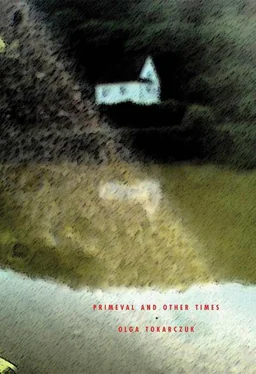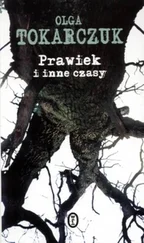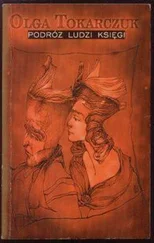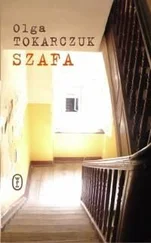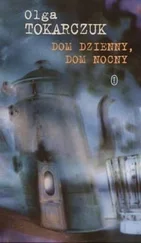Dying involved the systematic disintegration of what had been Izydor. It was a very rapid, irreversible process, self-perfecting and marvellously effective. Like deleting unnecessary information from the computer where the accounts were done at the old people’s home.
First to disappear were the ideas, thoughts and abstract concepts that Izydor had made such an effort to acquire in the course of his life. All of a sudden the things in fours disappeared:
Lines Squares Triangles Circles
Addition Subtraction Multiplication Division
Sound Word Image Symbol
Mercy Beauty Strength Rule
Ethics Metaphysics Epistemology Ontology
Space Past Present Future
Width Length Height Time
Left Up Right Down
Struggle Suffering Sense of guilt Death
Roots Stem Flower Fruit
Sour Sweet Bitter Salty
Winter Spring Summer Autumn.
And finally:
West North East South.
Then his favourite places faded, then the faces of those he loved best, then their names, and finally whole people yielded to oblivion. Next Izydor’s emotions disappeared – some very old thrills (when Misia had her first child), some despair (when Ruta left), some joy (when the letter from her came), certainty (when he discovered the fourfold nature of things), fear (when he and Ivan Mukta were shot at), pride (when he got money from the post office), and many, many others. And finally, at the very end, when Sister Aniela said: “He has died,” the open spaces that Izydor had inside him began to roll up, spaces that were neither earthly nor celestial – they fell apart into tiny pieces, caved in on each other and vanished forever. It was an image of destruction more terrible than any other, worse than war, fires, stars exploding or black holes imploding.
That was when Cornspike appeared at the old people’s home.
“You’re too late. He’s dead,” Sister Aniela told her.
Cornspike didn’t answer. She sat down by Izydor’s bed. She touched his neck. Izydor’s body wasn’t breathing any more, his heart wasn’t beating inside it, but it was still warm. Cornspike leaned over Izydor and said into his ear:
“Go, and don’t stop in any of the worlds. And don’t be tempted to come back again.”
She sat by Izydor’s body until they took it away. Then she remained at his bedside all night and all day, mumbling continually. She only went when she was sure Izydor had gone forever.
God has grown old. In the Eighth World He is now old. His mind is getting weaker and it is full of holes. The Word has become gibberish. So has the world, which arose from the Mind and the Word. The sky is cracking like desiccated wood, the earth has decayed in places and now falls apart under the feet of animals and people. The edges of the world are fraying and turning to dust.
God has tried to be perfect, and has come to a stop. Anything that does not move is at a standstill. Anything that comes to a standstill falls apart.
“Nothing comes of creating worlds,” thinks God. “Creating worlds leads to nothing, nothing develops, or broadens, or changes. It is all in vain.”
For God death does not exist, although sometimes God would like to die, as the people die, whom He has imprisoned in the worlds and entangled in time. Sometimes the people’s souls escape from Him and disappear from His all-seeing eye. That is when God feels the greatest yearning. For He knows that apart from Him there exists an invariable order, joining everything variable into a single pattern. And in this order, which even contains God Himself, everything that seems transient and scattered in time starts to exist simultaneously and eternally, outside time.
Adelka got out of the Kielce bus on the Highway and felt as if she had woken up, as if she had been asleep, and had dreamed about her life in some city, with some people, amid muddled, unclear events. She shook her head and saw the avenue through the forest to Primeval ahead of her, with the lime trees on either side, and the dark wall of Wodenica – everything was in its place.
She stopped to adjust her handbag on her shoulder. She glanced down at her Italian shoes and her camel-hair coat. She knew she looked beautiful, like someone from a fashion magazine, like someone from the big city. She walked ahead, teetering on her high stilettos.
As she came out of the woods, she was struck by the vastness of the sky, which suddenly unfurled in its entirety. She had forgotten the sky could be so large, as if it also contained other, unknown worlds. She had never seen a sky like that in Kielce.
She saw the roof of the house, and couldn’t believe how much the lilac tree had grown. When she came closer, for a moment her heart sank – Aunt Stasia’s house wasn’t there. Instead the sky had flooded the place where it had always stood.
Adelka opened the garden gate and stopped in front of the house. The door and windows were shut. She went into the back yard. It was overgrown with grass. Some little bantam hens ran out towards her, as brightly coloured as peacocks. Then it occurred to her that her father and Uncle Izydor had died, but no one had told her, and now she had come to an empty house in her smart coat and her Italian stilettos.
She put down her suitcase, lit a cigarette, and walked across the orchard to the spot where Aunt Stasia’s cottage used to stand.
“So you smoke now,” she suddenly heard.
Instinctively she threw the cigarette to the ground and felt a lump in her throat, caused by her old, childhood fear of her father. She looked up and saw him. He was sitting on a kitchen stool in the heap of rubble that had once been his sister’s house.
“What are you doing here, Dad?” she asked in surprise.
“I’m keeping an eye on the house.”
She didn’t know what to say. They looked at each other in silence.
She could see he hadn’t shaved for weeks. His stubble was entirely white now, as if hoarfrost had settled on his face. She noticed that he had grown much older in all these years.
“Have I changed?” she asked.
“You’ve got older,” he replied, turning his gaze on the house. “Like everyone.”
“What’s happened, Dad? Where’s Uncle Izydor? Doesn’t anyone help you?”
“Everyone demands money from me and wants to take over the house as if I weren’t alive any more. But I am still alive. Why didn’t you come to your mother’s funeral?”
Adelka’s hands were longing for a cigarette.
“I just came to tell you that I’m doing fine. I graduated, and I’m working. I have a big daughter already.”
“Why didn’t you have a son?”
Again the familiar lump rose to her throat, and once more she felt as if she had just woken up. Kielce did not exist, there were no Italian stilettos or camel-hair coat. Time was sliding downwards, like the undermined bank of a river, trying to carry them both off into the past.
“I just didn’t,” she said.
“You’ve all got girls. Antek has two, Witek has one, the twins have two each, and now you. I remember it all, I keep a rigorous count and I still haven’t got a grandson. You’ve disappointed me.”
She took another cigarette from her pocket and lit it.
Her father stared at the lighter flame.
“What about your husband?” he asked.
Adelka inhaled with relief and blew out a cloud of smoke.
“I haven’t got a husband.”
“Did he leave you?” he asked.
She turned and headed towards the house.
Читать дальше
